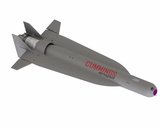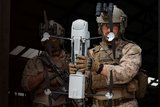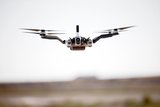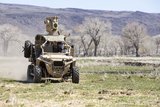Preliminary Design Review Validates Technological Maturity of Future Combat Systems Common Controller
Boeing and Science Applications International together the Lead Systems Integrator (LSI) for the U.S. Army's Future Combat Systems (FCS) modernization program, today announced that the program's Common Controller has successfully completed its preliminary design review (PDR). This evaluation allows the Common Controller to begin testing with the Army later this year.
"The combined government and industry team delivered a mature design that meets the FCS program schedule and requirements," said Roy Seaton, FCS LSI Common Control program manager. "The Common Controller will serve many FCS systems, and this successful, timely review paves the way for our customers to evaluate early design prototypes."
The Common Controller consolidates control of numerous systems into one integrated controller, simplifying logistics and empowering the soldier. Primarily, it controls the FCS Class I Unmanned Aerial Vehicle, the Multifunctional Utility/Logistics Equipment vehicle, the Small Unmanned Ground Vehicle, unattended ground sensors, and select ground vehicle functions and their respective payloads.
The controller also provides situational awareness to dismounted soldiers conducting operations outside of their vehicles. The Common Controller hardware is being developed and supplied to the Lead Systems Integrator by Lockheed Martin in Grand Prairie, Texas.
"The Common Controller PDR marks the successful completion of the last of our individual platform and system reviews and clears the way for the FCS System-of-Systems PDR in May," said Gregg Martin, Boeing vice president and FCS program manager.
"The entire FCS One Team continues to execute to their commitments, which enables our program to remain on plan. Following the System-of-Systems PDR, we'll be focusing on executing our critical design reviews and moving into final test and evaluation of our systems."
More from Uncrewed Vehicles
-
![Cummings Aerospace showcases Hellhound loitering munition designed for US Army’s LASSO programme (video)]()
Cummings Aerospace showcases Hellhound loitering munition designed for US Army’s LASSO programme (video)
Cummings Aerospace presented its turbojet-powered Hellhound loitering munition at SOF Week 2025, offering a man-portable solution aligned with the US Army’s LASSO requirements.
-
![SOF Week 2025: PDW unveils attritable FPV drone for SOF operations at scale]()
SOF Week 2025: PDW unveils attritable FPV drone for SOF operations at scale
PDW has revealed its Attritable Multirotor First Person View drone at SOF Week 2025, offering special operations forces a low-cost, rapidly deployable platform for strike and ISR missions, inspired by battlefield lessons from Ukraine.
-
![SOF Week 2025: Teledyne FLIR white paper provides guidance on reusable loitering munitions]()
SOF Week 2025: Teledyne FLIR white paper provides guidance on reusable loitering munitions
Teledyne FLIR is highlighting the emerging requirements for 'recoverable and re-usable' loitering munitions across the contemporary operating environment during this week’s SOF Week conference in Tampa, Florida.
-
![SOF Week 2025: Kraken Technology group debuts K3 Scout USV in North America]()
SOF Week 2025: Kraken Technology group debuts K3 Scout USV in North America
High-performance maritime industry player Kraken Technology Group, based in the UK, has used the SOF Week conference in Tampa, Florida this week to debut its K3 Scout uncrewed surface vessel (USV) to the North American market.
-
![Palladyne AI and Red Cat to demonstrate capabilities for autonomous drone swarms to the US military]()
Palladyne AI and Red Cat to demonstrate capabilities for autonomous drone swarms to the US military
Red Cat and Palladyne AI recently conducted a cross-platform collaborative flight involving three diverse heterogeneous drones.
-
Jammer resistant drone designs spark search for countermeasures
The Russia-Ukraine conflict has driven another stage of evolution for drones and the counter measures to defend against them.

























